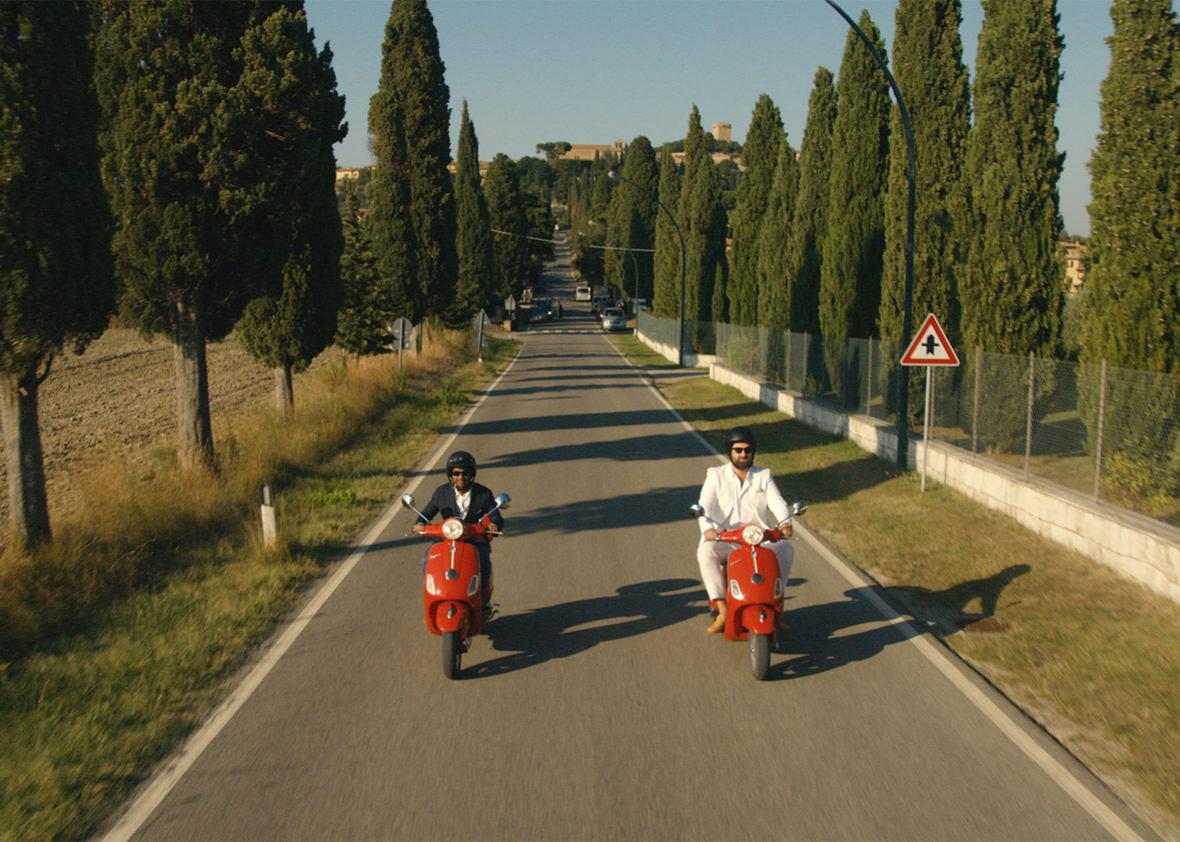It’s an audacious move for a sitcom, no matter how great, to invite comparisons to Vittorio De Sica’s bleak neorealist classic The Bicycle Thief. But that’s exactly how Master of None begins its 10-episode second season, which premieres on Netflix on May 12. In the season premiere, “The Thief,” which was shot in black and white on location in Italy, Aziz Ansari’s Dev makes plans with a cute, funny British woman he just met, only to have his phone stolen immediately after they part. Her number is in his phone, and he doesn’t know much about her outside of her first name and the fact that she, too, lives in New York City. What if she’s the one he’s been searching for, the one he could spend the rest of his life eating pasta with? Dev spends the rest of the episode frantically combing the cobblestoned streets alongside the Italian boy who works in the restaurant where he’s studying as an apprentice, agonizing over the girl that got away and the thief who’s come between him and the woman who could be his true love.
Of course, Dev, the well-off actor who can afford to study the fine art of cuisine in Italy for a few months, shares little in common with De Sica’s weary Antonio, a poor man who won’t be able to provide for his family unless he recovers his stolen bike. But this loving—if comparatively casual—nod to that mournful 1948 drama is still affecting whether or not you catch the reference. And it’s only the first of many choices that show off the grand aspirations of Ansari, his co-creator Alan Yang, and their stable of collaborators, who come back swinging for the fences aesthetically, thematically, and emotionally. From the aerial cinematography that lingers on the gorgeous Italian countryside to the Slacker-esque episode that leaves behind Dev and the show’s other regulars to drop in on the lives of a series of city dwellers who will never appear again, creative risks abound—and more often than not, they pay off.
When we last left Dev, he was echoing Carrie Bradshaw’s unwillingness to settle for anything short of “ridiculous, inconvenient, consuming, can’t-live-without-each-other love,” declaring his disappointment that his now-ex Rachel estimated their chances of ending up together forever at 70 percent, when friends “seemed like they were at 100.” Meanwhile, his career was going nowhere after his scenes were cut from the final version of the fictional schlockfest The Sickening, which he’d hoped might at least give him some exposure. Not much has changed this time around. Dev is still looking for that 100 percent feeling, and he’s still trying to figure out where his career is going. But Season 2 isn’t merely a retread of the Hopeless Romantic and the City. Dev does eventually put down his pasta fork and return to New York, but his romance with food continues—and comes paired with an adventure as the host of a competition show that allows the second season to skewer the frivolousness of reality television just as pointedly as the first one took on ethnic stereotypes in scripted entertainment.
We also get the return of beloved characters like Dev’s parents (played once again by Ansari’s parents—still wooden as actors and still delightful to watch), the goofy confidant Arnold (Eric Wareheim), and Denise (Lena Waithe), who is finally given some backstory via a wonderfully conceived episode recounting the many Thanksgivings she and Dev have shared together with her mother, aunt, and grandmother since they were kids. Her journey of coming out to her family strikes just the right notes of humor and sadness, especially since, in an ingenious bit of casting, the ageless Angela Bassett guest-stars as her barely tolerant mother. (While, as Ansari mentioned in a recent profile in New York magazine, the show avoids directly invoking the current administration, this season is hardly apolitical. Ansari and co. find a few ways to respond to past criticisms, and a major twist in the final episode is practically ripped from the headlines.)
But over the last few years, it’s been Ansari’s curiosity about millennial dating habits that has become his signature in his stand-up, his heavily researched manual for modern dating, and, of course, in this wistful, winning Netflix series. At its core, the show is a rom-com buoyed by optimism but also laden with the unpleasant realities that accompany any emotional entanglements. The penultimate episode of Season 1, “Mornings,” told through vignettes chronicling Rachel moving in with Dev, was Season 1’s high point, a brilliant exercise in tracing the outlines of a budding, passionate romance that fizzles as time wears on and dull familiarity settles in. Season 2’s own penultimate episode is even more ambitious and sobering. It’s an hourlong minimovie that unpeels the layers of Dev’s flirtatious relationship with a woman who’s with someone else. Watching the two grow closer over the course of a month reveals Dev’s commitment to living intensely, almost painfully, in the discomfort of a potentially heartbreaking dalliance, and Ansari demonstrates a refreshingly restrained side as an actor that clashes fascinatingly with Dev’s usual openness. The episode is Master of None’s explicit take on another classic Italian film, the even more subdued L’Avventura. (The two are shown watching a scene from the 1960 Antonioni drama, and Dev imagines that they’re the protagonists.) The homage may not be subtle, but the show’s willingness to dig so deep into the heart of every subject it explores is so captivating it doesn’t matter.
